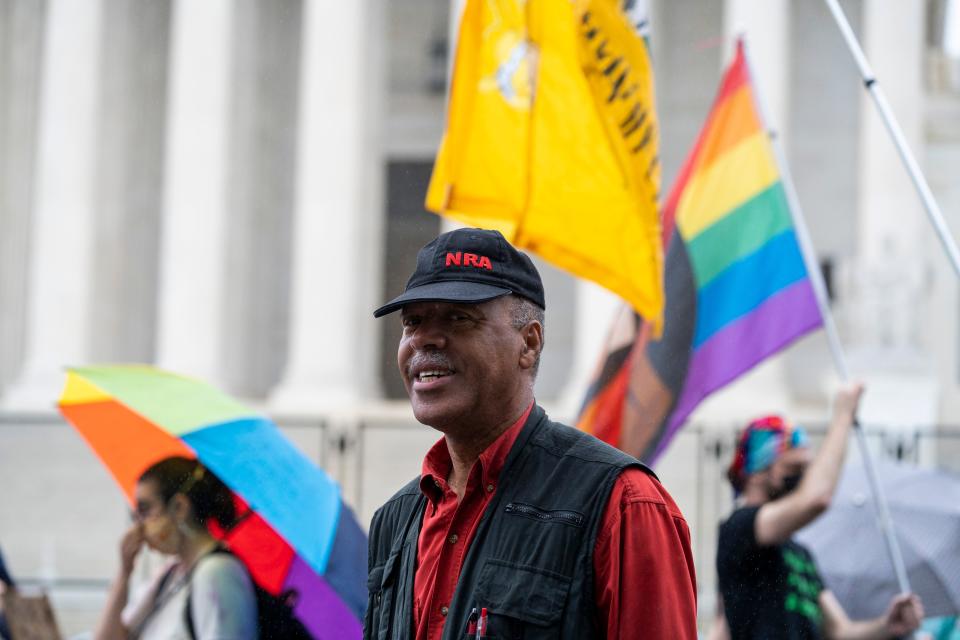The Supreme Court just made a monumental ruling on gun rights. Here's what it means
WASHINGTON – Millions of Americans could soon find it easier to carry handguns in public after a Supreme Court decision Thursday struck down a New York law requiring state residents to have a special need to carry weapons outside the home.
"We know of no other constitutional right that an individual may exercise only after demonstrating to government officers some special need," Associate Justice Clarence Thomas wrote in the 6-3 majority opinion. "That is not how the First Amendment works when it comes to unpopular speech or the free exercise of religion.... And it is not how the Second Amendment works when it comes to public carry for self defense."
The decision could shift the legal landscape on Second Amendment rights while Americans are divided over gun access, reeling from multiple mass shootings. The ruling landed as Congress appears to be poised to approve the most sweeping legislative package in response to such shootings in years.
Here's what you need to know about the decision:
Second Amendment: Supreme Court strikes down New York gun law in major ruling
'Sensitive' places: Should guns be banned in bars, hospitals?
Who brought the case?
Two upstate New Yorkers, plus the New York State Rifle and Pistol Association, sued then-New York State Police superintendent Kevin Bruen after a licensing officer denied them the carry privileges they sought.
What was the ruling?
The Supreme Court ruled in favor of the plaintiffs.
Writing for the majority, Thomas said that the law violates the Constitution by preventing "law-abiding citizens with ordinary self-defense needs from exercising their right to keep and bear arms."
How did the justices vote?
The court ruled 6-3, split along ideological lines.
Chief Justice John Roberts and Associate Justices Samuel Alito, Neil Gorsuch, Brett Kavanaugh and Amy Coney Barrett joined Thomas in the majority.
Associate Justice Stephen Breyer wrote a dissenting opinion, which Associate Justices Sonia Sotomayor and Elena Kagan joined. In his dissent, Breyer wrote that the court "severely burdens" states' efforts to address the dangers of gun violence.

What are the broader implications?
Five Democratic-led states have similar licensing requirements and so those laws will likely be challenged.
But the decision could have far broader implications for other laws because the high court is changing the standard used to review such laws. Thomas writes that in order to pass constitutional muster, gun regulations must have some connection to the nation's "historical tradition."
Meanwhile, the decision is likely to open a debate over how far cities and states may go to ban guns in "sensitive" places such as bars, sports stadiums and on public transit.
When was the last time the high court ruled on gun rights?
It's been more than a decade since the Supreme Court weighed in on the Second Amendment.
The court's decisions, one in 2008 and the other in 2010, affirmed the right to possess guns at home for self-defense. But the cases didn't address questions about carrying those weapons in public.
Do other states have laws similar to New York's?
Yes. At least five states have licensing laws similar to New York's. California, Hawaii, Maryland, Massachusetts, New Jersey and the District of Columbia have "proper cause' requirements, though the district's law was previously struck down by a federal appeals court.
Together, those states represent about a quarter of the nation's population.
Forty-three states, according to the Supreme Court, are "shall issue” jurisdictions, where authorities must issue concealed-carry licenses as long as applicants meet certain requirements.
History: A 700-year-old law may inform Supreme Court's Second Amendment decision
What was the Biden administration's reaction?
President Joe Biden's administration supported New York in the suit. In a statement released after the high court's decision, Biden said he is "deeply disappointed" in the ruling.
"This ruling contradicts both common sense and the Constitution, and should deeply trouble us all," Biden said.
What was the reaction from the NRA?
The nation's best-recognized gun rights group, the National Rifle Association, called the decision a "watershed win for good men and women all across America."
"The right to self-defense and to defend your family and loved ones should not end at your home," said NRA executive vice president Wayne LaPierre.
This article originally appeared on USA TODAY: Supreme Court's gun rights decision, explained

 money
money 